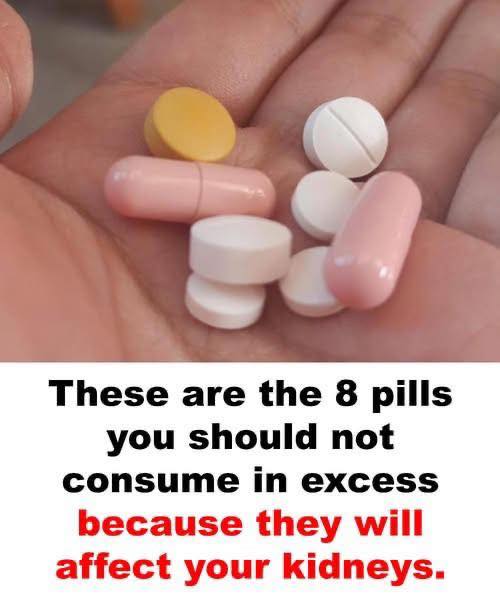
8 Common Medications You Should Avoid Overusing to Protect Your Kidneys
Your kidneys are essential for keeping your body in balance, filtering waste, regulating fluids, and supporting overall health. However, certain medications—though crucial for managing various conditions—can take a toll on kidney function, especially when used over extended periods. In this article, we’ll explore 8 common medications that could potentially harm your kidneys, helping you stay informed about how to use them safely.
1. Lithium – A Mood Stabilizer with Kidney Risks
Lithium is a key medication for managing bipolar disorder by stabilizing mood and preventing episodes of mania or depression. While it’s incredibly effective, long-term use can strain your kidneys.
The main concern is nephrogenic diabetes insipidus, a condition that disrupts the kidneys’ ability to concentrate urine, causing frequent urination and dehydration. If blood levels aren’t carefully monitored, this can lead to kidney damage. Patients on lithium should undergo regular kidney function checks to ensure their kidneys stay healthy.
2. Anticonvulsants – Phenytoin and Trimethadione
Used to control seizures in conditions like epilepsy, anticonvulsants like phenytoin and trimethadione are life-saving but can have a downside. Phenytoin, for instance, can cause interstitial nephritis, an inflammation that affects the kidneys’ tubules, potentially leading to kidney dysfunction. Trimethadione has also been associated with kidney toxicity.
If you’re on these medications, your doctor will likely recommend regular kidney function tests to catch any issues early.
3. Chemotherapy Medications – A Necessary Evil
Chemotherapy drugs like cisplatin, carboplatin, and mitomycin C are powerful treatments for cancer, but they can also be extremely hard on your kidneys. Cisplatin, in particular, is notorious for causing acute kidney injury (AKI), a rapid decline in kidney function. Other chemotherapy medications, such as cyclosporine and tacrolimus, can also damage kidneys, especially at high doses.
Patients receiving chemotherapy are closely monitored to track kidney health, and adjustments may be made if kidney damage is detected.
4. Propylthiouracil – Thyroid Treatment with Potential Kidney Risks
For individuals with hyperthyroidism, propylthiouracil (PTU) is often prescribed to regulate thyroid hormone levels. However, long-term use of PTU can sometimes lead to kidney damage, particularly in those with pre-existing kidney issues. Though this side effect is rare, it’s crucial to monitor kidney and liver function to catch any potential problems early.
5. Heartburn Relief Medications – PPIs and Kidney Damage
Proton pump inhibitors (PPIs), like omeprazole, pantoprazole, and lansoprazole, are commonly used to treat heartburn and GERD. But prolonged use of these drugs has been linked to an increased risk of chronic kidney disease (CKD). PPIs may interfere with the kidneys’ ability to filter waste, leading to kidney injury over time.
If you rely on PPIs, it’s a good idea to consult your doctor about the risks and monitor kidney function during long-term use.
6. Antivirals – Protecting Your Kidneys While Fighting Infections
Antiviral medications like acyclovir, indinavir, and tenofovir are essential for treating infections like herpes and HIV. However, these drugs can sometimes damage kidneys, particularly when taken at high doses or in patients who are dehydrated.
Acyclovir can cause kidney problems if dosed improperly, while indinavir and tenofovir are known to potentially lead to long-term kidney damage. Regular monitoring is crucial for anyone using these medications, ensuring kidney function remains in check.
7. Captopril – A Blood Pressure Medication That May Impact Kidneys
Captopril, an ACE inhibitor, is widely prescribed for high blood pressure and heart failure. While effective, it can reduce blood flow to the kidneys in some individuals, particularly when combined with other medications or in those with pre-existing kidney conditions. In rare cases, it may cause acute kidney injury.
If you’re on captopril, make sure to have your kidney function regularly assessed to prevent any complications.
8. Bone and Joint Medications – Infliximab, Chloroquine, and Hydroxychloroquine
Medications for conditions like arthritis, lupus, and malaria—such as infliximab, chloroquine, and hydroxychloroquine—can sometimes harm the kidneys. Long-term use of these drugs has been linked to kidney damage, particularly in those with pre-existing kidney disease.
Though these medications are vital for managing chronic diseases, be sure to discuss potential risks with your healthcare provider and monitor kidney health regularly.
Conclusion: Protect Your Kidneys with Knowledge
While these medications play a crucial role in managing various health conditions, it’s essential to understand the potential risks to your kidneys. Regular check-ups, kidney function tests, and open conversations with your healthcare provider can help mitigate the risks of long-term kidney damage.
Remember, your kidneys are vital to your overall health. By staying informed and proactive, you can protect these essential organs while managing your condition effectively. Always consult with your doctor if you have concerns about any medication you’re taking, especially if it’s on this list.